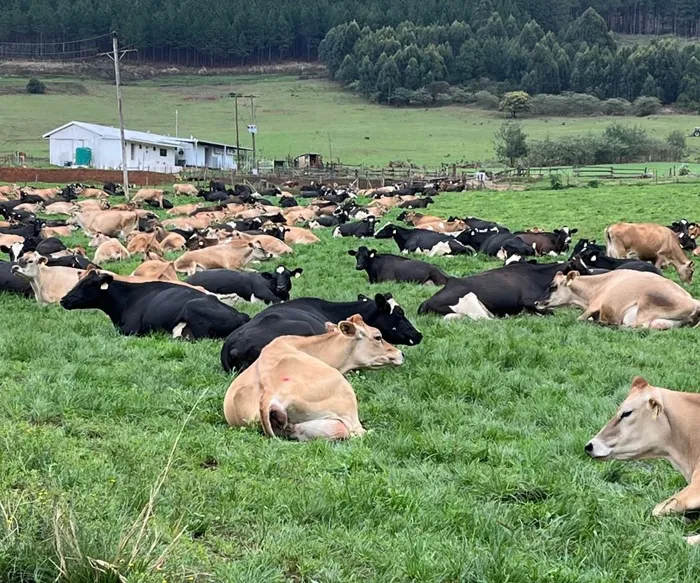
Foot and Mouth Disease has affected several farms, mainly in northern KwaZulu-Natal.
Image: Supplied
Blurb: Farmers demand government to declare KZN a disaster area. They fear the foot-and-mouth outbreak could put milk supplies at risk
SUPPLIES of milk, butter and cheese could be at risk as the country’s dairy industry faces an escalating crisis, with Foot and Mouth Disease (FMD) spreading “like a veld fire” across KwaZulu-Natal.
Earlier this week, the broader livestock industry, under the umbrella of the KwaZulu-Natal Agricultural Union (Kwanalu), urgently called for the formal declaration of FMD as a provincial disaster. While there’s no milk shortage yet, industry leaders warn that without urgent state intervention and mass vaccination, the situation could take a turn for the worse.
“We are not at panic stage yet,” said Fanie Ferreira, CEO of the Milk Producers Organisation. “But we can get there.”
He says currently there is “more than enough milk in South Africa”, and the situation is likely to remain stable, given that the country is entering its “spring flush” – when dairy cows in KZN, the Eastern Cape and parts of the Southern Cape begin calving, and production rises by as much as 50%. “From here on, we produce more milk day by day,” said Ferreira.
But he cautioned that if FMD spreads south across the N3, or into larger herds, things could turn increasingly grim. “It’s not in play yet, but it can very easily shift. That’s what everyone is worried about.”
Ferreira says that unlike beef cattle, which typically recover from FMD within days, dairy cows are severely affected. “About 80% of infected dairy cows develop severe mastitis,” he said. “Of those, 20% don’t survive and must be culled.”
He warned that the period between mid-May and early August, based on outbreaks over the past two years, is when “its at its worst.”
“This window in winter is just perfect for FMD to spread. In that stage, usually your beef cattle calves are now weaned, so not much of your beef cattle are producing milk for calves right now and they are not affected. But our dairy cattle are now calving so we're the total opposite.”
Last year, the FMD outbreak in the Eastern Cape affected 70 000 head of cattle, and some dairy farms lost up to R5 million within three months due to treatment costs, discarded milk and long-term production losses. Ferreira warned that without decisive action, the same pattern could repeat in KZN, where the disease is currently centred in the Dundee, Newcastle and Normandien areas.
While the numbers are significant, he noted that in the national context, it's not a large portion of the industry. “It’s preventable … and that’s the issue. This is a human failure, not a farming failure,” Ferreira said.
Although 900 000 doses of vaccine are expected to arrive in the country in the coming days, Ferreira said it's not nearly enough as the doses are intended for all livestock sectors nationally, not just dairy.
He believes vaccinations are the solution to the FMD crisis, placing the blame squarely on government protocols that prohibit preventative vaccination. “The government has got to allow us to vaccinate our animals. That’s it. Nothing else,” he said.
Ferreira said international animal health authorities have confirmed that milk from vaccinated cows is safe. “If vaccinated before infection, milk is safe. No double pasteurisation needed. That’s scientifically proven.”
David De Jager, CEO of Tip-Top Milk, one of South Africa’s largest raw milk logistics providers, says the outbreak has already disrupted milk collection routes and limited processor supply.
“We don’t have strong enough biosecurity protocols, there aren’t any vaccination programmes, and the response time from the government in dealing with these outbreaks has been slow,” De Jager said.
He said that when farms are quarantined inside Disease Management Areas, animal movement is halted, which affects breeding cycles and could lead to overstocking and rising production costs. “Dairy relies on precision, predictability, and mobility – from farm milk storage tanks to processing plants; without free movement, processing slows, retail commitments falter, rural economies suffer, and the milk price fluctuates,” said De Jager.
He warned that beyond local disruptions, the international reputation of South African dairy was also on the line. “We’ve had several international markets suspend imports of South African dairy and livestock products, and the reputational damage to our industry could take years to recover. It’s immeasurable.”
With outbreaks now confirmed in “large beef feedlots” in Gauteng, De Jager fears the worst may still lie ahead. “If we don’t get this outbreak under control urgently, it won’t just affect farmers, farm workers and farming communities dependent on the industry. It will affect the entire supply chain; drivers, factory workers, logistics teams, and eventually consumers at the shelf.”
Kwanalu which represents dairy, beef, sheep and game industries in KZN has urged both the provincial and national government to declare the outbreak a provincial disaster.
Angus Williamson, Kwanalu Vice President and Chair of the Red Meat Producers Organisation, says the economic fallout is already being felt. “International markets are noticing and rejecting our exports. This is no longer a local or provincial problem , it’s a national risk.”
Last month, China suspended all imports of beef and other products derived from cloven-hoofed animals from South Africa. However, Vusi Zuma from the KZN Department of Agriculture told the Independent on Saturday that the situation is under control. “We are certainly on top of it, so it's not a case of an emergency. We are in serious control of it and we think that in the next few months we can be declared as free from FMD.”